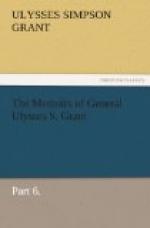Lee soon mounted his horse, seeing who it was, and met me. We had there between the lines, sitting on horseback, a very pleasant conversation of over half an hour, in the course of which Lee said to me that the South was a big country and that we might have to march over it three or four times before the war entirely ended, but that we would now be able to do it as they could no longer resist us. He expressed it as his earnest hope, however, that we would not be called upon to cause more loss and sacrifice of life; but he could not foretell the result. I then suggested to General Lee that there was not a man in the Confederacy whose influence with the soldiery and the whole people was as great as his, and that if he would now advise the surrender of all the armies I had no doubt his advice would be followed with alacrity. But Lee said, that he could not do that without consulting the President first. I knew there was no use to urge him to do anything against his ideas of what was right.
I was accompanied by my staff and other officers, some of whom seemed to have a great desire to go inside the Confederate lines. They finally asked permission of Lee to do so for the purpose of seeing some of their old army friends, and the permission was granted. They went over, had a very pleasant time with their old friends, and brought some of them back with them when they returned.
When Lee and I separated he went back to his lines and I returned to the house of Mr. McLean. Here the officers of both armies came in great numbers, and seemed to enjoy the meeting as much as though they had been friends separated for a long time while fighting battles under the same flag. For the time being it looked very much as if all thought of the war had escaped their minds. After an hour pleasantly passed in this way I set out on horseback, accompanied by my staff and a small escort, for Burkesville Junction, up to which point the railroad had by this time been repaired.
CHAPTER LXVIII.
Morale of the two armies—relative conditions of the north and south —president Lincoln visits Richmond—arrival at Washington—president Lincoln’s assassination—president Johnson’s policy.
After the fall of Petersburg, and when the armies of the Potomac and the James were in motion to head off Lee’s army, the morale of the National troops had greatly improved. There was no more straggling, no more rear guards. The men who in former times had been falling back, were now, as I have already stated, striving to get to the front. For the first time in four weary years they felt that they were now nearing the time when they could return to their homes with their country saved. On the other hand, the Confederates were more than correspondingly




